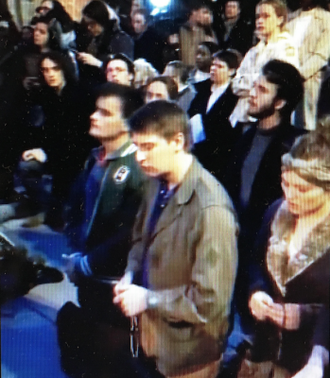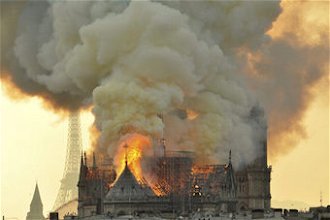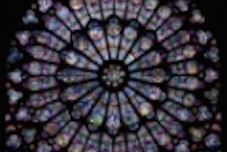Viewpoint: Praying the Rosary outside Notre Dame

Screenshot
In June 2016, my father and I flew down to Nice. It was a fairly quick one-night stopover to see England play Iceland in Euro 2016.
On the way to our hotel as we were driving along Nice's Promenade des Anglais we decided, in our rather poor French, to try and make conversation with our Uber driver. We asked him if he was following the French team. He replied with an emphatic non! We asked why not, and were greeted with an answer we could never have expected.
"Too many black players," he said!
He then started quizzing us on how many England players were black, assuming that we would share his revulsion. It was an awkward - and mercifully short - ride. He didn't get five stars!
When I got back home, I mentioned this to a colleague who had worked extensively in France and owned property out there. "The French just haven't bought into multiculturalism," he said, sharing my views that even the most outspoken London cabby wouldn't venture to share racist views with complete strangers in this day and age.
Seventeen days later, those same difficulties with multiculturalism were proven once again on that very same street. A Tunisian man named Mohamed Lahouaiej-Bouhlel drove a 19-tonne truck down the Promenade des Anglais through the crowds celebrating Bastille Day, killing 86 and wounding almost five hundred more.
There's a lot to love about France, but even the most patriotic Frenchman will tell you that at the moment, it's a country with issues. The far-right is a more credible force in politics than in just about any other developed country; the ethnic and cultural tensions around France's larger immigrant groups are always lurking in the background; the country has been the scene of some of the worst post-9/11 terror attacks; and an unemployment rate hovering just below ten percent, combined with tax cuts for the rich and fairly low wages for everyone else have reignited Frances long celebrated love of climbing the barricades in protest.
That, in part, is why the Gilet Jaunes protests took off. The 'high-vis' jackets required by law in every car in France became a handy symbol for protesting everything that's wrong with the country.
It seems lazy to argue that France's cultural problems can be fixed by the country getting back in touch with its Catholic roots, but yet it's also true that periods of upheaval and instability in France have often been accompanied by a rejection of the Church: The French revolution coincided with an unprecedented period of dechristianisation. Likewise, the May 1968 riots were mirrored two months later by those famous scenes of lay Catholics walking out of Notre Dame in protest at the publication of Humanae Vitae.
In both cases, and the many others, there are 'chicken and egg' arguments to be had about which came first, but the link is clear: For the fille ainée de l'Eglise - the oldest daughter of the Church - periods of mass social upheaval and a rejection of the Catholic faith do seem to go hand in hand a lot of the time.
This all came to my mind as I watched Notre Dame Cathedral burn. It's a place I know well - a beautiful part of an absolutely wonderful city. It wasn't easy watching it burn, and it was equally troubling watching the news reports come in, and reading the mixed bag of comments being posted on line.
More than a few people pointed out that the Notre Dame fire came on the heels of a spate of attacks on churches in France. Attacks which the mainstream secular media are largely ignoring. Of course, there is no evidence that the fire at Notre Dame was started maliciously, but the point was well made: there are Catholic currents in France right now that are largely going unnoticed.
At one point last night a group of people gathered on the banks of the Seine and, as the BBC put it, started singing. They were singing indeed, but the BBC missed the big take away from that moment - the fact that they were singing the rosary; the fact that they were praying. French Catholicism was poking its head out and reminding the world that it's still here.
Yes, this is a cultural and historic landmark. That's been pointed out more than a few times, but it's more than that. First and foremost, it's a Church. It's a reminder that French history is steeped in Catholic history. The reaction of French Catholics, and indeed those around the world, tells an important story about what's going on at the moment - as does the media's reluctance to report it.
The Catholic Church in France is in an interesting position at the moment. I last went to a parish Mass in France in 2017, and what I saw lined up well with what I see in England. The congregation was small and largely quite old.
But yet, there are some remarkable things happening in France too. Outside of the main parish structures new movements are having a big impact. The traditional movements and the charismatic movements active in France are perhaps strange partners, but yet they share in common the fact that they are making a big impact - especially the latter, and especially among younger Catholics.
I've been in youth and young adult ministry for a few decades now and whenever I meet young committed French Catholics their backstories almost always include groups like Chemin Neuf and the Emmanuel Community.
The Emmanuel Community was founded in 1976, and today has almost twelve thousand members, nearly three hundred priests, and looks after seventy parishes around the world. In each case, the vast majority are in France. If you think that's unimpressive, consider that those numbers are doubling every dozen years or so.
Chemin Neuf are increasing at a similar rate, and already look after a dozen French parishes, and there are several other "new communities" with similar stats and stories.
The traditional communities in France are also growing, and also attracting young people. Their numbers aren't quite as impressive, but they're definitely on the rise.
The point is that some things in French Catholicism are thriving. If things keep progressing as they are now, some commentators predict that there will be just over five hundred diocesan clergy in France by 2040. If the new communities and the traditional groups keep expanding as they are, then they will have by far the larger share of French clergy by that point, and with it control of most parishes and a heck of a lot of leverage.
Catholicism in France can and will survive, but it will almost certainly look a lot different in the future. The awful fire at Notre Dame might just remind France that Catholicism still runs deep and, with any luck, might just invite people to join one of those growing communities or even to revitalise their flagging parishes.
If such an awful tragedy can remind France that it is Catholic at heart and drive it towards that heart, then something good may just come from something so devastating.


















